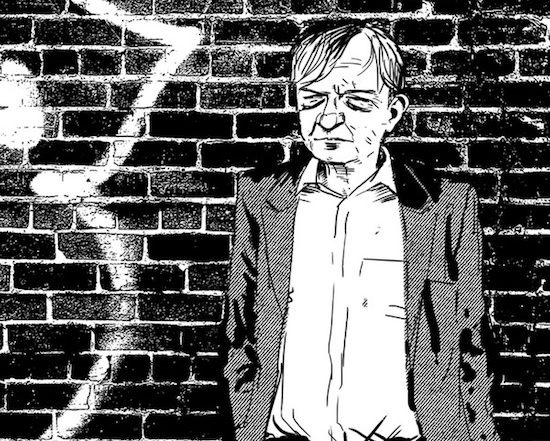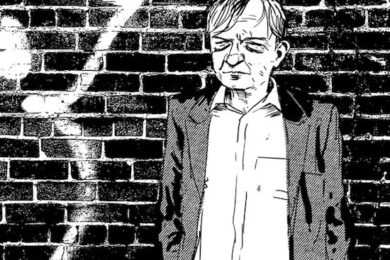Illustration by Krent Able
The tributes to Mark E Smith will no doubt reflect on his supposed dictatorship, band member sackings, amp twiddling, and the like. This does the group, and the memory of its leader of four-and-a-bit-decades, a disservice. Former members might disagree, but Mark E Smith was not the tyrant of cliché. In the greatest of bands, and there are too few of them, the music is grasped from an entity beyond the constituent sum of its parts. Let’s remember that Mark E Smith didn’t start out as the singer of The Fall. He was the guitarist but, inexorably, realised that The Fall, this brew of the English arcane, “northern white crap that talks back” from a Prestwich Jerusalem, the divining of magical characters from ordinary worlds, was more than whichever people happened to be playing guitars, bass, drums, synth. It was an idea and a vision, and Smith, I think, saw himself as its voice, curator – as he put it, the hip priest.
As such, Mark E Smith and The Fall (despite being the ultimate music journalist’s band) defied categorisation, that tedious delineation of years of work into imperial phases and so on. It meant that you could tap in to The Fall energy at any time of your life and have it transform you. They influenced half the bands I loved as an impressionable teenager, which is where I first heard of them, on a music magazine giveaway cassette featuring Suede’s Fall tribute song ‘Implement Yeah’. I didn’t pick them up properly until I went on a whim to see them at London’s Dingwalls venue in the late 90s, one of the supposedly terrible phases of the group. The room was half empty. I only really remember there being someone playing bass or guitar, a keyboard, and drums… and Mark E Smith, wandering, yelling, snapping, fragments of poetry cutting through post-Britpop tourist Camden night. It was haphazard and late and crap and the weirdest and most brilliant thing I had ever seen. It changed my perception of what a musical group could be, right there, right then. There was nothing secret or hidden away or super exclusive about loving them. It was never snooty. Art music, but art for all.
My first Fall albums were 1999’s The Marshall Suite, swiftly followed by 2000’s The Unutterable, which I still count as my favourite Fall LP. I’d met older Fall fans who’d insist they’d been shit since Hanley left or whatever but then revealed that they’d not listened to any of the records since, preferring to delve trainspotter-like into bootleg versions of old songs. They had not received Dr Buck’s Letter. Through them I learned the lethal death grip of nostalgia. It taught me to demand artists you love – and not just in music, and maybe even yourself – to not only plough new furrows, but blithely scythe across past achievements. We’ve all got great memories associated with Mark E Smith and The Fall. Without them, The Quietus as is wouldn’t exist. I first properly met John Doran after The Fall played ATP in 2004. We got spannered and leapt around the bar when the DJs played ‘Hit The North’. In the early years of the site, when we’d lost all our funding, had no income, John was giving up drinking and I was getting divorced, constantly blasting The Fall was our way of keeping our spirits up and The Quietus alive. At that point, of course, they were releasing terrific albums Reformation! Post TLC and Imperial Wax Solvent.
You could encounter The Fall in one of their supposed fallow periods and they would still change your life. What better tool to spike the musical canon could you get? Smith could undoubtably have made a fortune had he churned out Don’t Look Back-style sets of classic albums, and played the game. The Fall wouldn’t allow Smith to do that. When they did play old songs they’d emerge entirely consistent with whatever the new Fall sound was – I remember a rendition of ‘No Xmas For John Quays’ that nobody really spotted until it was half done.
Smith knew when to wind up the power, he knew when it mattered. This was none more so when somehow the group managed to be the last to play at the Hammersmith Palais, the false temple of West London Clash punk bullshit. For that gig, Smith harnessed the power of the American group recruited during a recent US tour with the lads from home who made up the later band, and just pissed all over nostalgia. It was utterly glorious, as this grinding rendition of ‘Blindness’ (a track that I would take over nearly anything from the 70s/80s) testifies:
We’re not perhaps feeling that wrench as when Bowie or Leonard Cohen went, because Smith was a different kind of romantic, a grafter as much as a dreamer. He didn’t write too many song about love, after all. But perhaps that was because he stood for something beyond love, even self-love. Without getting too psychoanalytical, perhaps Smith loved The Group, and the fantastical characters he channeled, more than he loved himself.
Characters like Mark E Smith are easily ignored these days, too awkward, cantankerous, far from malleable, undeniably hashtagproblematic. Whether it’s healthy that artists must be on-message ‘woke’, even performatively so is a debate that needs to be had. A fucked culture needs mad fuckers like Mark E Smith, who can see outside themselves and grasp the intangible that is the well of great art and pour it into a mould of their own designing. These people still exist, of course, just I suspect in a younger generation they’re not necessarily young white men in guitar bands. It’s not for nothing that for the past decade a dream interview that John Doran and I tried to make happen was Mark E Smith in conversation with Wiley. It nearly happened. Now it never will.
I’d be the first to say that in recent years Fall albums had tailed off, though The Quietus’ Harry Sword made a convincing case that I was wrong. They infuriated me sometimes, like when you’d go and see them live and the brilliant new material would be interspersed with the run-of-the-mill garage staples like ‘Strychnine’ and ‘White Lightning’ that’d set the league of bald-headed men slopping out their lager. The last album I really loved was Your Future, Our Clutter, on which the last track ‘Weather Report’ saw Smith acknowledging the years he’d devoted, sacrificed, burned, for The Fall: "These are the greatest times of my life," he whispers in what might well be harsh irony; "You gave me the best years of my life."
When I last saw The Fall live it wasn’t much different from the first, except by 2017 and the triumph of shallow nostalgo-culture MES had become a bit of a meme, a curio, people writing "-ah" on the end of words, quoting John Peel and quacking on about grannies and bongos. It was at the 100 Club, another of those venues constantly described as "iconic", last August. He looked desperately unwell, his face swollen, a huge dome sprouting out of the top of his head. Despite his obvious physical discomfort, it was a gig that still had that Fall energy, and when Smith disappeared after a couple of songs to do the rest of the gig from the dressing room, his vocals were the best I’d heard him do in years. There was a sense of will, of purpose, of refusal to be cowed by an illness that would have floored most of us. It was awkward and strange and the old hands there wondered if it should have happened at all. Yet it was a night packed with women and men in their early twenties and they were the ones who seemed to have been most moved, most aware that even in this wrecked state, the vessel still sailed on. Even at the end, told that he shouldn’t be doing it, to take rest, Smith still wanted to continue. People said he should stop for the good of his health and recovery, but how could he? The Fall – whatever it was to him – was still there, driving him forward.
At the end, it seemed something had changed. Mark’s girlfriend Pamela Vander, an artist from Manchester’s wonderful queer scene, posted photos of him looking cheerily and homely on Instagram. He looked entirely comfortable in this most modern medium – the day after a gig Vander posted a slightly abstract photo of the band tucking into a roast post-gig. In front of Mark, a photo of a bowl of soup and a pile of spuds that might have been the sad diet of an invalid were it not for the fact that those who knew might remember a wonderful, loping track off The Unutterable – "Parmesian carrots with mushrooms / Frankly that I’ve never been keen on / It’s pumpkin soup and mashed potatoes / That’s for my Hallowe’en tea".
The cryptic messages never ceased, even until the end. Yet Smith’s final words came in a message delivered to the Fall congregation via Pamela after the last-minute cancellation of a gig in Bristol:
"A Message to All, to All. From Mark E. Smith/The Fall group. As I, like Pr Rupert leave Bristol with my tail between my legs, I wish to give my great apologies to everybody. This idiotic idea to do both shows was purely my idea, against the advice of Pamela and The Fall group, agent & promoter… From head patient to you, the patients. I love you all but cannot embrace you all, Mark E. Smith". I sense in those tender words, a warmth and a sense of peace that, perhaps, whatever Mark E Smith saw The Fall as being, it was approaching time for its transmissions, his conjuring or curation, to cease. He did right by The Fall, and right by us.



